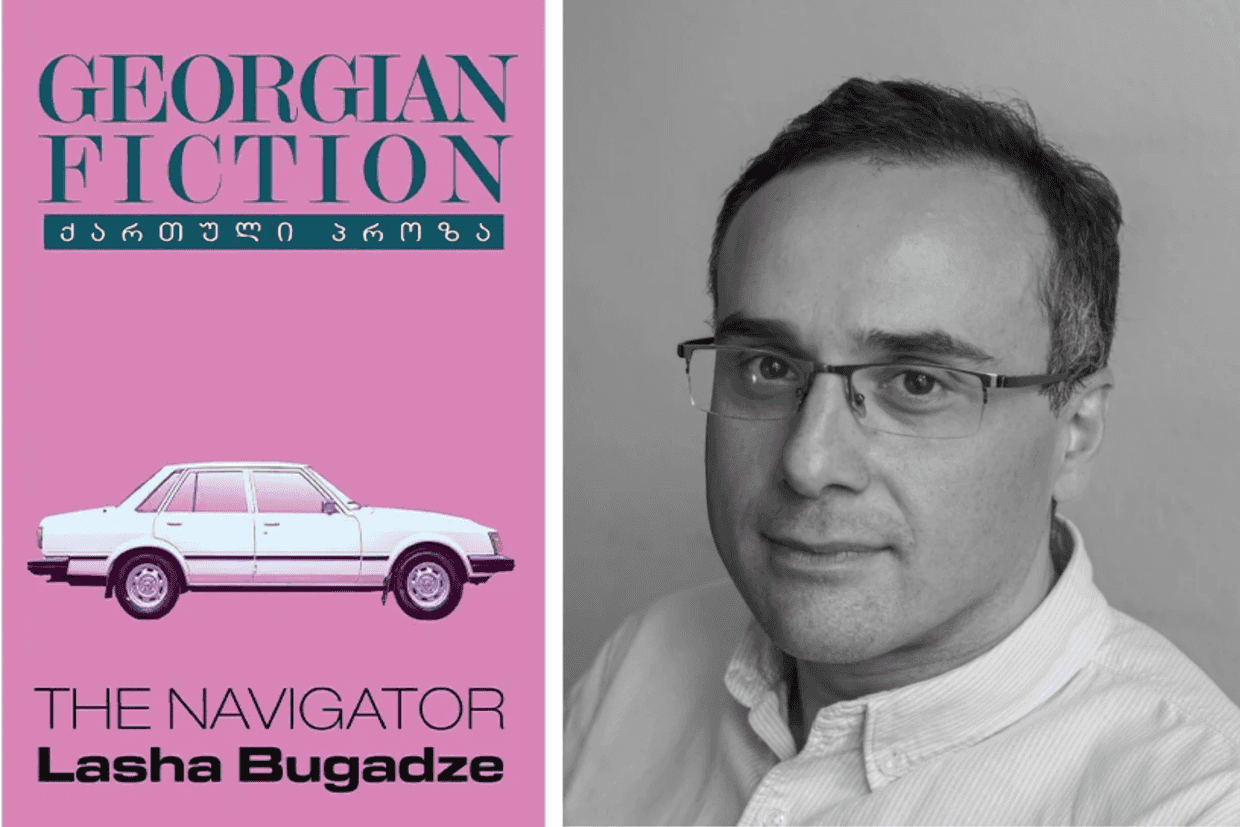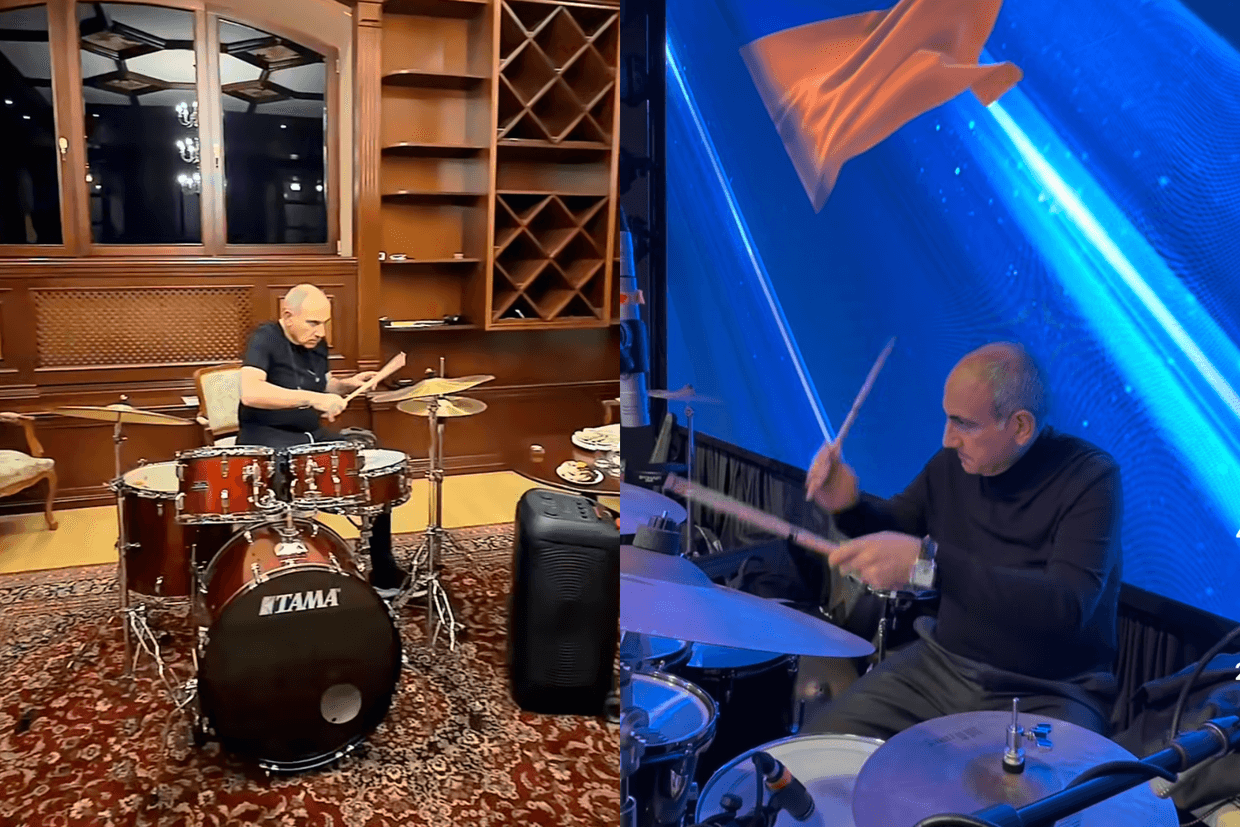Bacho Jikidze — the Georgian musician whose sharp tongue cuts through systems and melts hearts
Bacho Jikidze's music moves between razor-sharp satire and romance, capturing Georgia’s absurd politics and tender emotions with bold honesty.

There’s a point in a Bacho Jikidze show — maybe during a deadpan verse in his romantic ballad or as he sings about Georgia’s Secret Service — when it becomes clear that the man onstage is more than just a great musician.
Born in Abkhazia and displaced during the war in 1992, Jikidze grew up with the ache of exile.
‘People say I’m a philosopher because I studied philosophy, but I am not’ he tells OC Media with a shrug. ‘I just know that I know nothing’.
His modesty is misleading. Jikidze has written songs about Plato, Aristotle, and Freud, has crafted love ballads, and, since the early 2010s, has been making social commentary on the increasingly surreal landscape of modern Georgian politics with satire and humour.
‘Satire should make you laugh, but it should also make you angry’, Jikidze says.
His latest song, ‘Secret Service (Susi) has set its sights on me’— is a great example. It begins with the sting of personal rejection and spirals into state paranoia:
`You, darling, did not believe in me, you kept saying no one ever needs me
But look at me now, I’ve been waiting for this day for so long!
Today, the Secret Service (Susi) has set sights on me!’
The verses hit hard:
During the day, a rumour was spread
that I’m an agent of the deep state.
By midday, they cooked up a story,
claiming I cursed at the [Georgian] Patriarch.
By evening, I was labelled a sadist.
By night, I turned out to be an LGBT propagandist.
The audience cracked up when he performed the song for the first time in May 2025 live at Arteria Tbilisi.
Today, Susi set its sights on me
Tomorrow, Susi will set its sights on you.
Tomorrow, Susi will set its sights on all of you.
The song reflects well given where Georgian society is right now. Caught between authoritarianism, state propaganda, and freedom, where the same system that cracks skulls in the street and issues hefty fines for participating in demonstrations also becomes the punchline of underground jokes.
‘Satire comes from helplessness’, Jikidze admits. ‘You see someone being beaten up [by police] for nothing, and you can’t really do anything. So I write songs’.
His most popular song, ‘Song About an Oligarch’, exploded in popularity during Georgia’s Foreign Agent Law protests. The fact it went viral was less about algorithms, but because it was blasted from speakers at the demonstrations outside parliament during the voting session the day the law was passed.
The oligarch’s butt is guarding the whole nation!
Europe said, oh said so strictly,
If you want in, you should get rid of the oligarch’s butt!
But no! We won’t surrender, our oligarch’s butt, to the pervert, Europe.
Comfortable, like fish in the water,
like being wrapped in a crush’s arms
In comfort of the oligarch’s butt!
But the song has also become his personal albatross.
‘I’m tired of singing about someone’s butt,’ he says, laughing. ‘I swear, I have better songs.’
Even his band agrees.
‘When he plays that one, they all want to come up with excuses to leave the stage’, Jikidze’s wife, Anna, says, smirking.
But Jikidze is no protest singer. He’s just as likely to drop tender, romantic ballads, then switch to his satire songs, before going back to romance. Some of his great ballads are ‘Hand in Hand’ and ‘I Break in the Door’.
‘It’s not like I write love songs over here and political songs over there,’ he explains. ‘It’s the same world’.
But there’s something Vysotsky-esque about him — not just in his early solo guitar setup or guttural delivery, but in the way he turns micro-stories into allegories of a broken system.
His song, ‘Our district governor has a “thief-in-law” mindset’ is another shining example of Jikidze’s satire. The song paints a local official — part bureaucrat, part mafioso — from the perspective of local street corner gangs. When local disputes erupt, he’s not mediating with policy; he settles things with mafia logic.
When election season arrives, the governor tours the local corner crews, not with typical election promises — but with coded appeals to loyalty to the thief-in-law mentality.
Now, if we lose, brothers, our street code won’t hold up.
So we run around, collecting votes for our brother,
In everything, we stand by our governor.
Our dream will come true, when our governor becomes prime minister.
There’s a disturbing tenderness in his lyrics. It’s funny, it’s terrifying — knowing how these gangs usually extract votes in the neighbourhood — and it’s familiar, especially if you have ever voted in Georgia and seen the street gangs patrolling the election districts.
‘It’s based on a true story. A friend told me about this governor who came in all black, [characteristic to thief-in-laws] and settled the case with mafia logic[...] I wrote the song. Then it turns out his son listened to the song, and showed it to him. And you know what? The governor loved the song’, Jikidze says.
The governor is not the only one who does not always grasp Jikidze’s satire. His song, ‘People of Poti, don’t start the commoti’ is a great example of this — the song is a tongue-in-cheek ode to Georgian cities and their ‘bright futures’. For example, he lists Georgia’s cities, noting that the city of Poti will have the best port, Borjomi will be the best resort, Batumi will have the best boulevard, and of course, ‘Friends, please don’t forget that Kutaisi is the centre of Europe’.
‘The song was supposed to be sung by [Georgia’s ex-president Mikheil] Saakashvili in first person. In one of his speeches, [Saakashvili] said that Kutaisi is the centre of Europe, and then this whole song was assembled’, Jikidze says.
‘I thought I [sampled] some lies from Saakashvili, but no one even paid attention. [...] People just enjoyed the song for its positivity’.
Yet for all his bite, Jikidze is strikingly unassuming in person. He performs with theatrical arrogance, but offstage he’s soft-spoken, even shy.
‘The lights, the stage do something to me’, he says. ‘Every concert, I want to tell a new story’.
There’s no formula for his music; he improvises often, shifting tone and lyrics. His band, Bacho Jikidze and the Aesthetic Boys roll with it.
‘They’re used to my chaos now’, he chuckles.
In a region where political disillusionment runs deep and satire is becoming dangerous, Jikidze’s music is a rare kind of resistance — funny, fierce, and painfully honest.
‘I do not think they have time for me now, but if the Secret Service actually comes for me, so be it’, he says. ‘They’ll probably come for everyone eventually’.
🗞️ Subscribe to the OC Culture Dispatch
For our culturally curious readers: a free, biweekly selection of film, book, and music recommendations from the Caucasus. Our team offers a varied selection of hidden gems, cherished classics, and notable new releases from all over the region, included in our newsletter.









